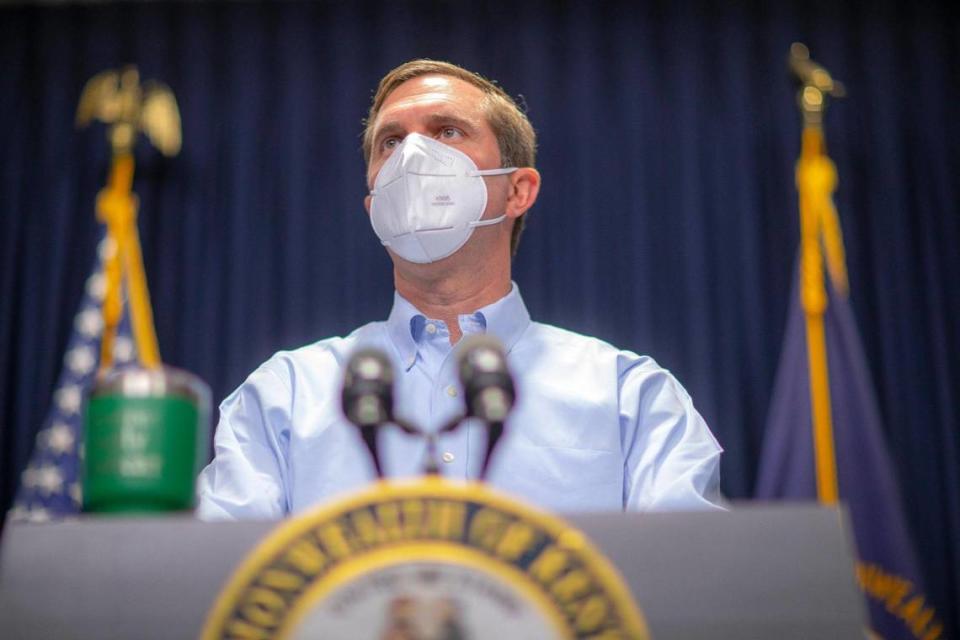Omicron continues to set records in KY, but experts say escalation may be ‘cresting’

Kentucky’s current COVID-19 surge propelled by the omicron variant continued to escalate on Monday. But the state may be nearing its infection peak.
Referencing models charting the length of omicron surges in New York, Rhode Island and the United Kingdom, Kentucky Public Health Commissioner Steven Stack said, “over the next week [or] two weeks, we should start seeing the backside of this escalation. If that’s the case, that’s really good news.”
That echoes accounts from Lexington doctors and hospital administrators Monday afternoon.
“I have the sense that it’s cresting right now,” Dr. Mark Dougherty, infectious disease specialist and epidemiologist at Baptist Health Lexington said in a news conference an hour before Dr. Stack and Gov. Andy Beshear gave their bi-weekly coronavirus update.
“We need it to transition from a pandemic to an endemic problem,” he said, “so [we] don’t get these massive surges that overwhelm hospital systems.”
Though omicron is killing fewer people than the delta strain of COVID-19, hospitals are still inundated with patients because the disease is still surging. The statewide rate of Kentuckians testing positive topped out at 33.06% on Monday, down a tick from Sunday’s 33.1%. Last week’s number of new coronavirus cases set yet another record at 83,159. Over the weekend, the state reported 25,445 new cases, and on Monday, another 3,912.
Administrators at UK HealthCare, CHI Saint Joseph Health and Baptist Health Lexington said their hospitals are near or have surpassed peak patient occupancy levels set during the delta surge. Statewide, overall patient occupancy is nearing its peak, Stack said. On Monday, 2,326 people were hospitalized with the virus, down from 2,366 on Saturday.
That deluge of patients is exacerbated by an acute staff shortage; more health care workers are contracting coronavirus than in previous surges, which compounds pre-existing staff shortages, especially among nurses, Dr. Dougherty said.
“All the health care systems are strained to the max,” he said. “Everyone is stretched to their limit. When we’re taking care of this many COVID patients, it means we can’t take care of other patients as well as we’d like to.”
Since omicron is so prevalent — Dougherty anticipates cases are at least four-times as high as the state’s formal count because so many are using at-home tests — hospitals are reporting more “incidental COVID” cases, said Dr. Dan Goulson, chief medical officer at CHI Saint Joseph Health. Dougherty said 40% of Baptist Health Lexington’s COVID patient census were incidental cases, meaning they arrived for another procedure, and as part of hospital testing protocol, were tested and tested positive.
That doesn’t mean hospitals are any less burdened by patients, or that people should take omicron less seriously, Dr. Goulson said. Part of the reason for a spike in incidental cases is the mere fact that omicron is everywhere, they said.
“Please don’t mistake my comments for saying this is not a dangerous disease,” he said. “It is still a dangerous disease. But it’s behaving a little bit differently than it has in the past.”
Whereas delta settled in the lungs and causes more serious respiratory issues, omicron tends to settle in the upper airways and nasal passages, Lexington doctors said. Echoing Goulson, Dougherty said this doesn’t always mean the disease poses a less severe threat.
The infectious disease doctor said during this current surge, he has treated more COVID-positive patients with blood clotting, which comes with its own set of severe risks, he said.
“COVID-19 isn’t just about the lungs,” he said. “It’s a multi-system illness.”
Though the patients who are filling intensive care unit and requiring mechanical ventilation to breathe are largely unvaccinated, doctors reported, fully-vaccinated and boosted Kentuckians continue to test positive.
Beshear gave his news update from the Governor’s Mansion on Monday because his 12-year-old son, Will, tested positive for COVID-19 earlier that morning. The governor said his son, who is fully-vaccinated and has received a booster dose, was “generally asymptomatic.”
The rest of the Beshear family has tested negative.

 Yahoo Movies
Yahoo Movies 